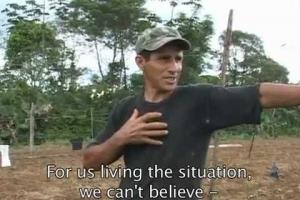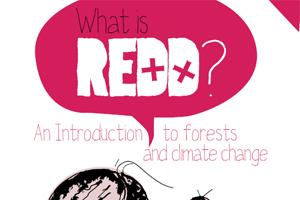By FERN. Community voices about a forest carbon offset project.
frameborder="0" width="640" height="480">
The Green Economy
The Green Economy is a tactic used to “clean up” the image of corporations rather than address corporate capture and capitalism as the true drivers of deforestation. False solutions promoted under the Green Economy include certification, sustainable forest management, ecosystem services, REDD+, the bioeconomy, nature-based climate solutions, and zero net deforestation. Rather than stopping it, these “solutions” support corporate-driven destruction that is causing a deep social and ecological crisis.
Bulletin articles
30 May 2012
According to the International Labour Organization (ILO), an estimated 160 million people suffer from work-related diseases, 270 million are involved in work-related accidents annually, and two million workers die from work-related diseases and accidents every year. ILO Director-General Juan Somavia has stated that the “green economy” – promoted by the UN itself and the central theme of the Rio+20 conference next month – should work towards greater protection of the health and safety of workers across the world.
Other information
30 May 2012
EJOLT (Environmental Justice Organisations, Liabilities and Trade) is an ambitious collaborative project that brings together 23 environmental organizations and academic institutions to catalogue ecological distribution conflicts and produce material for use by environmental justice organizations in their struggle against environmental injustice (see www.ejolt.org).
Other information
30 April 2012
A number of international civil society organizations and social movements have joined together to issue a statement against what they call the “corporate capture” of Rio+20: the zero draft of the conference declaration highlights the role of business as promoter of the so-called “green economy”, while failing to hold business accountable for its role in creating the financial, climate, food and other crises.
Other information
26 April 2012
By Carbon Trade Watch
This booklet aims to decode REDD+ * which is a focus in the international climate change debates. It will explore key ideas behind the complexities of REDD+ which link lands, forests and climate change. Although there are many ways different communities understand this link, this booklet aims to introduce and problematize the terms that are used in the REDD+ debate
Bulletin articles
30 March 2012
All around the world there are women struggling every day of the year. Since the 20th century, however, International Women's Day has become a date on which their struggle is commemorated and highlighted. Women on every continent, urban, rural, indigenous, black, lesbian, among so many others, mark this date on the streets, raising their banners, which are countless, against gender inequalities that are manifested at the local and global levels.
Other information
30 March 2012
The article: “Environmental services and the promotion of the commodification and financialization of nature: Forests, tree plantations and the green economy” published in last WRM bulletin Nº 175, raised a complaint from the NGO Forest Trends. The complaint concerned the information given in such article on the lack of public input for the approval of a law promoting trade in environmental services in Acre, Brazil.
Other information
30 March 2012
Several social organizations from different parts of the world have signed and published the briefing “Carbon markets will not deliver for Southern governments, forests and people
Bulletin articles
30 March 2012
Business as usual dressed up in green
Humanity is moving along old paths in new clothes. The current civilization model, which is portrayed as hegemonic but actually corresponds to a small minority of the planet, is dragging it towards its limits, exposing it to multiple crises.
Bulletin articles
28 February 2012
In view of the upcoming Rio+20 conference,(*) taking place this June, WRM would like to offer some background information on issues that will undoubtedly be at the top of the agenda of this international event. Among those issues are so-calledenvironmental services and related phenomena, such as payments for and trade in environmental services.
Bulletin articles
28 February 2012
The term environmental services, also known as ecosystem services, includes the noun “service”, a term that is widely used in the capitalist market economy, in which companies and professionals provide and charge for a wide range of services. Therefore, environmental services suggests that there is, on the one hand, something or someone that offers or provides a service, and on the other, someone who receives or uses it. This logic also seems to apply to the case of environmental services and their “trade”.
Bulletin articles
28 February 2012
To understand the emergence and development of the idea of environmental services, it is important to consider at least two crises that hit the industrialized countries of the North, particularly the U.S. and Europe, especially hard in the 1970s: the environmental crisis and the crisis of the capitalist economy.


